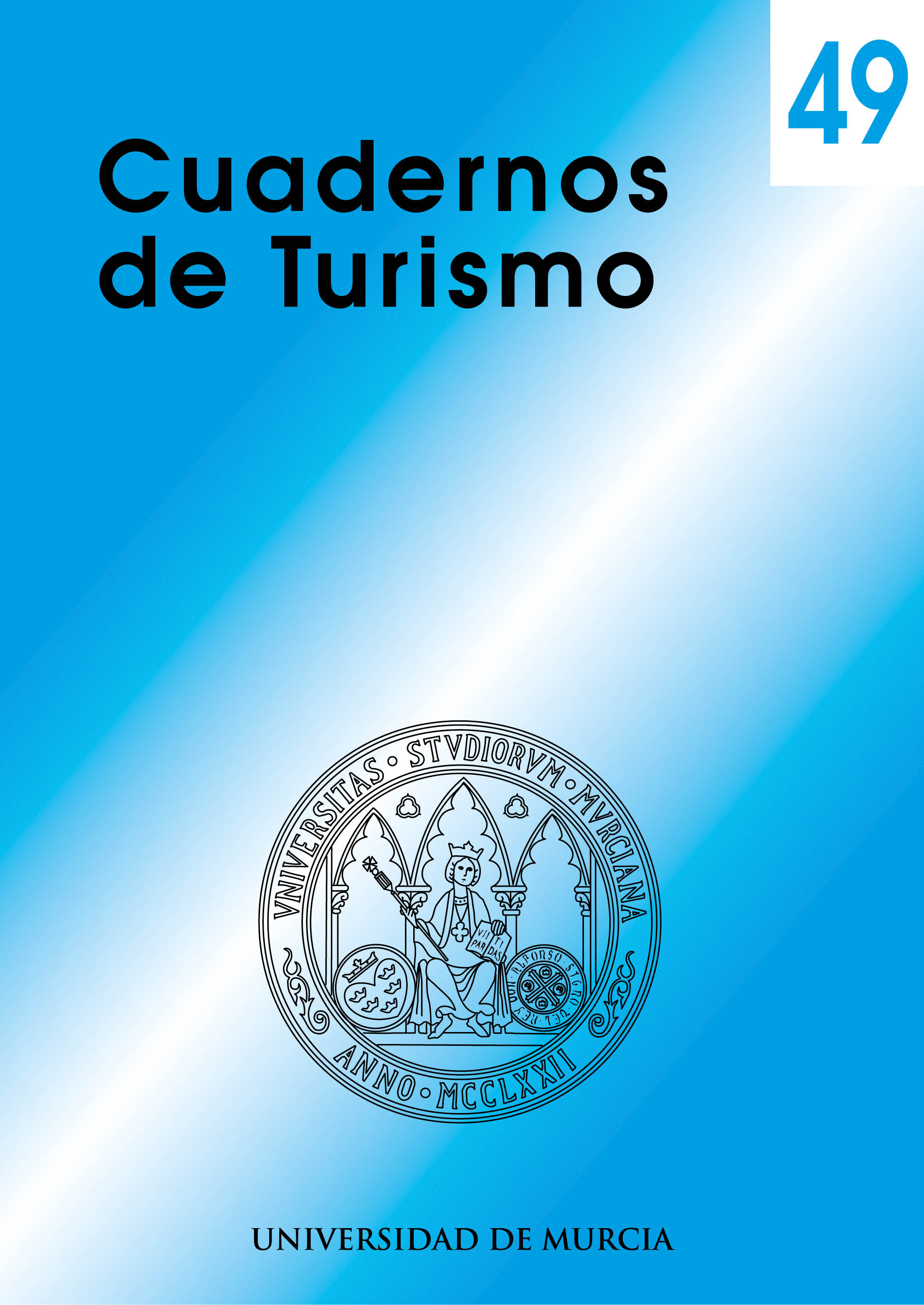ANTHROPIC AND TECHNOLOGICAL RISKS, TOURISM AS AN ALTERNATIVE? CASE STUDY
Abstract
Human intervention in the Territory through the implementation of planning -from the dual purpose of organizing and designing its evolution- is a current ambition that, however, we cannot consider as exclusively contemporary. Despite the incursions made in a more or less recent past in what has come to be known as Territory Planning, at present there are not a few sectors of the scientific community, in general, and of the geographical and legal ones, in particular, those who believe that hardly without an intervention of the “public powers” in the territory -through “planning”-, a balanced spatial structure could be achieved, which contributes to the achievement of a more supportive society and, ultimately, with fewer inequalities -at least, in terms of opportunities-. All this without forgetting that when dealing with the environment, historical reality has shown us that the relationship between the natural environment and the industrial subsystem -including the tourism sector- has given rise to specific forms of environmental management. An example can be found in the economic and social alternatives to industrial activities that involve significant technological risks with consequences that are not always positive for human life, as in the case of the Placeres-Lourizán factory complex, located in Herbalonga, in the parish of San Andrés de Lourizán, in the municipality of Pontevedra.
Downloads
-
Abstract1466
-
PDF (ESPAÑOL) (Español (E...1183
-
PDF (INGLÉS)1183
References
AA.VV. (1991): Metodología para la Incorporación del Medio Ambiente en la Planificación Económica. Sevilla, Junta de Andalucía.
ANTON CLAVÉ, S., RULLAN SALAMANCA, O. y VERA REBOLLO, J.F. (2011): “Mass Tourism Development on the Mediterranean Coast”, Tourism Geographies, vol. 13 (3), pp. 495-501.
ABREU Y PIDAL, J.M. (1975): El medio natural en la planificación del desarrollo. Madrid, ICONA.
ACOSTA, F. (1986): “Modelos”, Revista Ecosistemas, pp. 58-59.
AGUILAR, S. (1997): El reto del medio ambiente. Conflictos e intereses en la política medioambiental europea. Madrid, Alianza Universidad.
AGUILAR, S. y SLOCOCK, B. (1996). “El reto medioambiental en la Europa Oriental. Lecciones de la experiencia de Occidente", Gestión y Administración Pública, nº 5-6, pp. 229-240.
CALVO GARCÍA-TORNEL, F. (1984): La Geografía de los riesgos. Barcelona, Geocrítica, Año IX, nº 54.
ESPEJO MARÍN, C. y GARCÍA MARÍN, R. (2017): “Caso 3. La planificación del turismo en áreas rurales”, en Simancas Cruz, M.R. (Coord.) La planificación y gestión territorial del turismo. Madrid, Síntesis, pp. 229-258.
GOODLAND, R. (1997): Medio Ambiente y Desarrollo Sostenible: más allá del informe Brundtland. Madrid, Ed. Trotta.
GONZÁLEZ, M. (1997): Valoración económica del uso recreativo-paisajístico de los montes: aplicacion al Parque Natural de Monte Aloia en Galicia. Tesis Doctotal, Departamento de Economía Aplicada, Facultad de Ciencias económicas y Empresariales Universidad de Vigo.
GONZÁLEZ BERNÁNDEZ, F. (1976): “Problemas ecológicos de la conservación del medio ambiente”, en AA. VV. Conservación del medio ambiente, Revista de la UCM, vol. XXV (105), pp. 165-173.
GREFFE, X. (1988): Descentralizar a favor del empleo. Las iniciativas locales de desarrollo. Madrid, Ministerio de Trabajo y Seguridad Social.
GREENPEACE (1988): The international trade in wastes. A Greenpeace inventory. Washington.
HARVEY, D. (2017): El cosmopolitismo y las geografías de la libertad. Madrid, Akal
LÓPEZ LÓPEZ, A. (2000) “Requisitos medioambientales para un programa de acción sobre Turismo Rural en la Comunidad Autónoma de Madrid”, Observatorio medioambiental, nº 3, pp. 195-222.
SOLER, M.A. (1997): Manual del Gestión del Medio Ambiente. Barcelona, Ed. Ariel.
SOTELO NAVALPOTRO, J. (1995): Economía Española: Los Marcos Sectorial y Social. Madrid, Editorial Mapfre, Fundación Mapfre Estudios, Instituto de Ciencias del Seguro, Colección Universitaria.
SOTELO NAVALPOTRO, J.A. y ALGARRA PAREDES, A. (1999): “Política Económica y Medio Ambiente. Un enfoque integrador”, Observatorio Medioambiental, nº 2, pp. 311-330.
SOTELO NAVALPOTRO, J.A. (1998): “Los contextos de la Política Ambiental Española actual: adaptación del Quinto Programa de la Unión Europea”, Observatorio Medioambiental, nº 1, pp. 127-140.
SOTELO NAVALPOTRO, J.A. (1998) “Medio Ambiente y Desarrollo en la España de los noventa: la problemática regional de los residuos tóxicos y peligrosos”, Anales de Geografía de la Universidad Complutense de Madrid, nº 18, pp. 257-280.
SOTELO NAVALPOTRO, J.A. (1999): Modelos de Organización y Desarrollo Regional. Madrid, IUCA.
SOTELO NAVALPOTRO, J.A. (2000): Regional Development Models. Oxford University Press.
SOTELO NAVALPOTRO, J.A. (2000) "Medio Ambiente y Desarrollo en España en los prolegómenos del siglo XXI: Las Políticas Medioambientales de la U.E.”, Observatorio Medioambiental, nº 3, pp. 341-397.
SOTELO PÉREZ, M. y SOTELO PÉREZ, I. (2017): “Una aproximación al marco teórico de los riesgos”, Observatorio Medioambiental, nº 20, pp. 9-36.
TAMAMES, R. (1977): Ecología y Desarrollo. Madrid. Alianza Editorial.
TAMAMES, R. (1989): "Pobreza, penuria y subdesarrollo, Documentación Social, nº 76, pp. 33-41.
Las obras que se publican en esta revista están sujetas a los siguientes términos:
1. El Servicio de Publicaciones de la Universidad de Murcia (la editorial) conserva los derechos patrimoniales (copyright) de las obras publicadas, y favorece y permite la reutilización de las mismas bajo la licencia de uso indicada en el punto 2.
2. Las obras se publican en la edición electrónica de la revista bajo una licencia Creative Commons Reconocimiento-NoComercial-SinObraDerivada 3.0 España (texto legal). Se pueden copiar, usar, difundir, transmitir y exponer públicamente, siempre que: i) se cite la autoría y la fuente original de su publicación (revista, editorial y URL de la obra); ii) no se usen para fines comerciales; iii) se mencione la existencia y especificaciones de esta licencia de uso.
3. Condiciones de auto-archivo. Se permite y se anima a los autores a difundir electrónicamente las versiones pre-print (versión antes de ser evaluada) y/o post-print (versión evaluada y aceptada para su publicación) de sus obras antes de su publicación, ya que favorece su circulación y difusión más temprana y con ello un posible aumento en su citación y alcance entre la comunidad académica. Color RoMEO: verde.





_.jpg)







